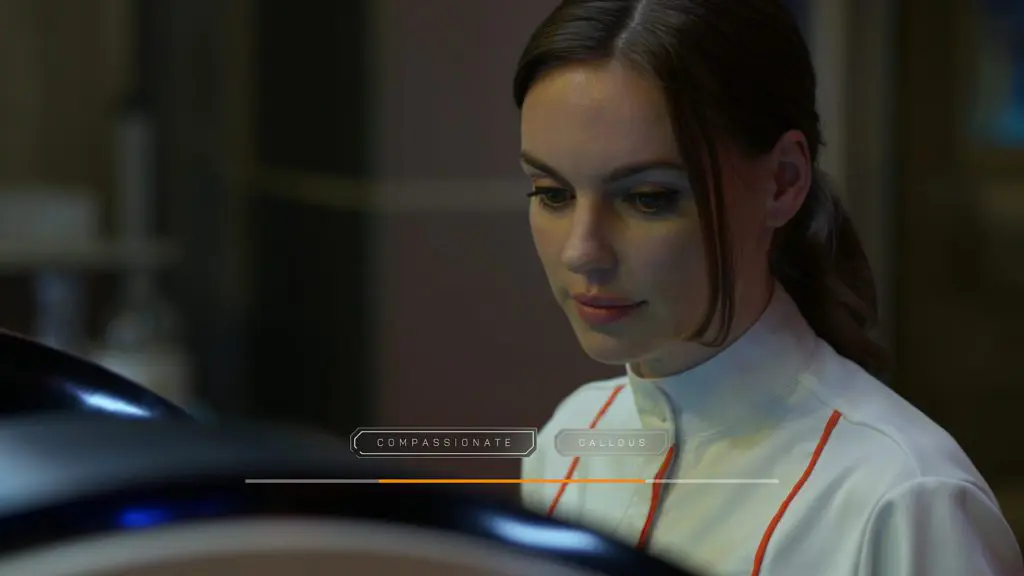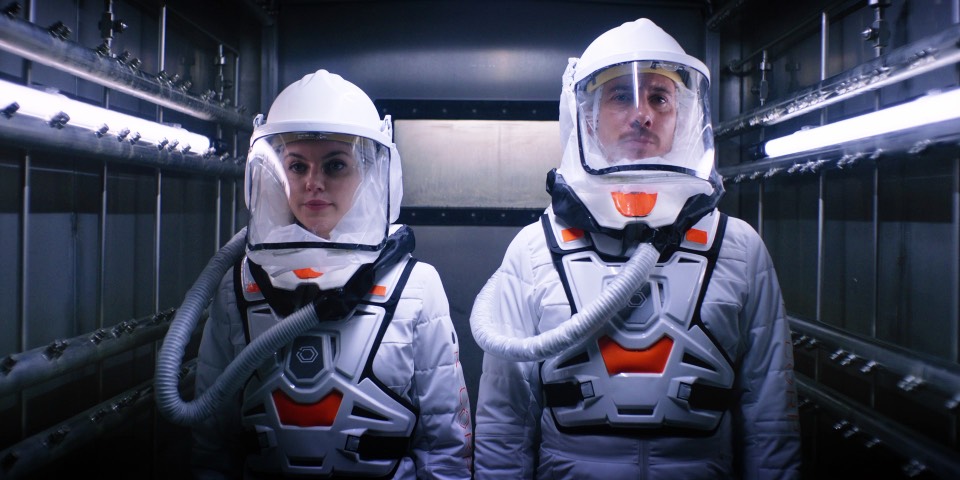Summary
A cliche-ridden plot and some questionable casting choices undermine an otherwise respectable attempt at reviving the interactive movie genre.
This review of The Complex is based on the game’s PC version. It is also available on PS4, Xbox One, Nintendo Switch, and Mac.
You have to respect developer Wales Interactive for their dedication to revitalizing a genre that fell out of favor in the early ‘90s and never made much sense to begin with. I enjoy that kind of resilient creative spirit, even if I haven’t necessarily enjoyed The Bunker or Late Shift, both of which were the studio’s previous attempts at giving FMV games a leg-up in contemporary culture. Netflix is thinking along the same lines with stuff like Black Mirror: Bandersnatch, which is bad news for a tiny company with only a handful of employees and much shallower pockets, even if their latest multiplatform effort, The Complex, has a generic sci-fi story overseen by Lynn Renee Maxcy, who worked on The Handmaid’s Tale.
That kind of creative pedigree is nice, though it’s typically hamstrung by an ungainly hybrid genre that tries to combine the high-quality dramatic production of film with the unique interactivity of games and mostly ends up being a lackluster example of both. Players are tasked with making choices on behalf of Dr. Amy Tennant (Michelle Mylett), a typically gorgeous and suspiciously youthful biologist with loads of experience treating chemical attacks in worldwide warzones despite not looking a day over thirty. The opening of The Complex makes this all quite clear, as Amy, and thus the player, has to decide which of two dying patients to save within a rapidly expiring time limit. I saved the pregnant woman, as I imagine most other people did, though the game reflects how little I cared about the decision by only bothering to call back to this moment once towards the end of the story.
That story, which occurs five years later, finds Amy now working for the incredibly shady biotech firm Kensington Corp, outfitting British astronauts for a forthcoming mission to Mars with magical nanotechnology developed in a top-secret high-tech subterranean research bunker dubbed, somewhat hilariously, Security Lab Alpha. That nanotechnology, through a variety of convoluted story turns involving Kensington’s obviously immoral founder Nathalie (Kate Dickie) and the company’s public links to the fictional dictatorship of Kindar, ends up in the bloodstream of Clare (Kim Adis), who spews her guts up on the London Underground and is promptly isolated in Security Lab Alpha with both Amy and her insufferable ex-lover, Rees Wakefield (Al Weaver).

To recap, then, we have a single-location setting, a potential bio-weapon, strong undertones of corporate immorality, and the ticking-clock of Kindarian dissidents trying to bypass the security vacuum which stands between Security Lab Alpha and potential freedom. The Complex is, essentially, a straight-to-VOD sci-fi thriller that you can influence a little bit through your occasional decision-making, a lot of which revolves around Amy’s basic interactions with other characters, the effects of which are expressed as percentages in a pause menu that I rarely ever looked at.
There are, of course, actual life-and-death choices to make; the game promises nine separate endings and 196 possible scenes, and you can get virtually everyone killed if you try hard enough. But the illusion of choice in what is otherwise a hugely deterministic experience grates after a while, especially in small decisions that are immediately undermined or swerved away from to keep the narrative on more manageable tracks – tell Amy to answer a certain video call, for instance, and Rees will shout over her to reject it, and many other examples besides. In most choice-based narrative games I advise only playing once, since I like the idea of that version of events being mine, and don’t particularly care what might have happened had I selected a slightly different option three hours prior. But The Complex actively encourages repeat playthroughs, lasting only an hour at its longest and allowing players to skip scenes they’ve already seen to hurry to the new ones; this is a nice convenience feature when it comes to maximizing longevity, but the story’s seams are very visible by the time you’ve finished.
This kind of experience lives and dies on the strength of its characters and plot, neither of which particularly impress in The Complex. The story is generic light sci-fi claptrap with a sprinkling of broader themes and ideas that are never explored, and the characters are exaggerated archetypes brought to life by actors who seem legitimately sick of working through the same scene with only minor deviations. The camera always seems more interested in ogling Amy than taking in what she’s actually doing, and Rees’s goofy quip-a-minute personality made me actively wish to be rid of him. Sometimes the game leans into its silliness in a way that can only be intentional, such as having Scottish CEO Nathalie strut about in tartan pants with a tumbler of whiskey, but the plot’s other minor figures are questionable at best. The smug designer of Security Lab Alpha, Parker Caplani (Okorie Chukwu), is discussed as a kind of dangerously immoral architect-for-hire yet seems to have a personal stake in the outcome, and Nathalie’s assistant Emily (Rachel Petladwala) had a ridiculous heel-turn moment in the first ending I got that fell so flat it made me laugh out loud.
With all this, it’s difficult for The Complex to impress despite its workmanlike production and higher-caliber-than-usual talent, both in front of and behind the camera. Lacking both humor and insight, it’s a hollow effort, and far from being the shot in the arm for a maligned genre, it’s mostly a reminder of why such things never really work.



